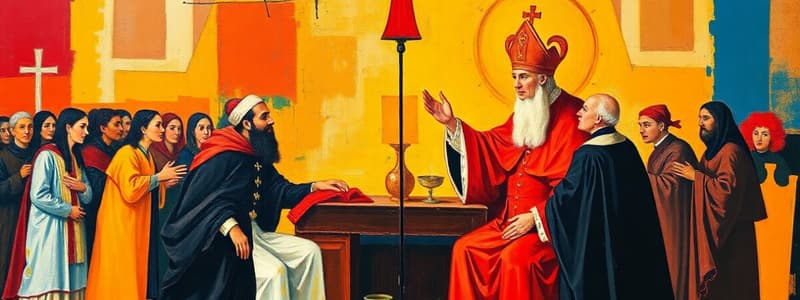Podcast
Questions and Answers
What was the primary reason Philip IV wanted Clement V as Pope?
What was the primary reason Philip IV wanted Clement V as Pope?
- To restore the Papacy in Rome
- To initiate reforms in the Church
- To control the Papacy's actions and policies (correct)
- To strengthen the Church's independence
What event marked the beginning of the Great Schism?
What event marked the beginning of the Great Schism?
- The election of Pope Urban VI
- The return of Pope Gregory XI to Rome
- The election of Pope Clement VII (correct)
- The invasion by the Roman mob during the election
What was the outcome of the Council of Constance?
What was the outcome of the Council of Constance?
- It resolved the Great Schism (correct)
- It established a new papal territory
- It led to the election of a fourth Pope
- It condemned earlier heretical groups
Which theologian was known for criticizing the worldliness of the clergy in the 1400s?
Which theologian was known for criticizing the worldliness of the clergy in the 1400s?
What did the Conciliar movement emphasize?
What did the Conciliar movement emphasize?
Which group was known for earlier denying the authority of the Pope?
Which group was known for earlier denying the authority of the Pope?
What did John Wycliffe emphasize regarding the role of the Pope?
What did John Wycliffe emphasize regarding the role of the Pope?
What aspect of faith did William of Ockham stress as important for religious life?
What aspect of faith did William of Ockham stress as important for religious life?
Flashcards
The Great Schism
The Great Schism
The period from 1378 to 1417 when there were competing claims to the papacy, leading to a schism within the Catholic Church.
Avignon Papacy
Avignon Papacy
The period between 1309 and 1378 when the papacy was located in Avignon, France, rather than Rome.
Conciliarism
Conciliarism
The belief that church councils have as much or more authority than the Pope in governing the Church.
Individual Piety
Individual Piety
Signup and view all the flashcards
Jan Hus
Jan Hus
Signup and view all the flashcards
Nominalism
Nominalism
Signup and view all the flashcards
Council of Constance
Council of Constance
Signup and view all the flashcards
Indulgences
Indulgences
Signup and view all the flashcards
Study Notes
The Great Schism (1378-1417)
- Conflict between French and English kings regarding Church property taxation
- Pope Boniface VIII responded to French taxation with Unam Sanctum
- Philip IV of France pressured election of Clement V as the new Pope.
- Clement V moved the papacy from Rome to Avignon (1309-1376)
- This move is also known as the Babylonian Captivity.
- Pope Gregory XI returned to Rome in 1377
- Cardinals (mostly French) elected Urban VI as Pope.
- Cardinals dissatisfied with Urban VI due to perceived harshness, and elected Clement VII in opposition
- Resulted in three popes for a period (a major crisis)- Avignon papacy (Clement VII), and the restoration of the papacy in Rome (Urban VI)
- Council of Pisa in 1409 attempted to resolve the situation,but unsuccessful
- Council of Constance (1414-1418) finally resolved the situation and established a single Pope
Papal Authority
- Popes claimed supreme authority over the Church
- Challenges arose from religious reformers regarding the role of popes
- Disputes involved the supremacy of councils or popes
- John Wycliffe, a British theologian stressed individual piety and challenged the authority of the Pope.
- Jan Hus, a Bohemian reformer, criticized papal worldliness and advocated for reforms in the Church.
Conciliarism
- Movement that advocated for the authority of church councils over the Pope
- Promoted the idea that Church Councils had ultimate authority
- Council of Constance addressed the Great Schism and challenged the papacy
Indulgences
- Church practice of reducing the time a soul spent in purgatory
- Raised money for the Church
Studying That Suits You
Use AI to generate personalized quizzes and flashcards to suit your learning preferences.





